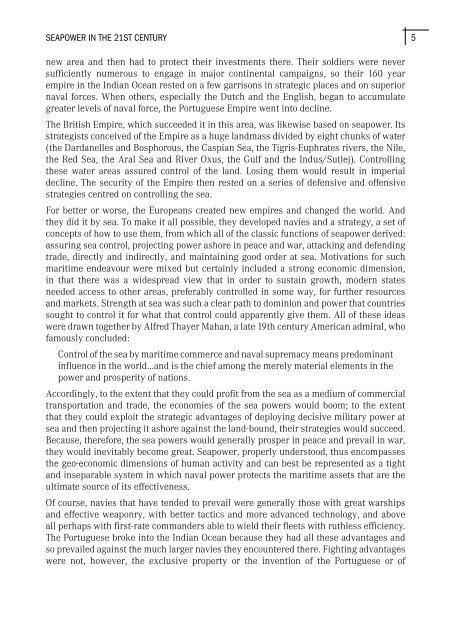Australian Maritime Issues 2005 - Royal Australian Navy
Australian Maritime Issues 2005 - Royal Australian Navy
Australian Maritime Issues 2005 - Royal Australian Navy
You also want an ePaper? Increase the reach of your titles
YUMPU automatically turns print PDFs into web optimized ePapers that Google loves.
SEAPOWER IN THE 21ST CENTURY<br />
<br />
new area and then had to protect their investments there. Their soldiers were never<br />
sufficiently numerous to engage in major continental campaigns, so their 160 year<br />
empire in the Indian Ocean rested on a few garrisons in strategic places and on superior<br />
naval forces. When others, especially the Dutch and the English, began to accumulate<br />
greater levels of naval force, the Portuguese Empire went into decline.<br />
The British Empire, which succeeded it in this area, was likewise based on seapower. Its<br />
strategists conceived of the Empire as a huge landmass divided by eight chunks of water<br />
(the Dardanelles and Bosphorous, the Caspian Sea, the Tigris-Euphrates rivers, the Nile,<br />
the Red Sea, the Aral Sea and River Oxus, the Gulf and the Indus/Sutlej). Controlling<br />
these water areas assured control of the land. Losing them would result in imperial<br />
decline. The security of the Empire then rested on a series of defensive and offensive<br />
strategies centred on controlling the sea.<br />
For better or worse, the Europeans created new empires and changed the world. And<br />
they did it by sea. To make it all possible, they developed navies and a strategy, a set of<br />
concepts of how to use them, from which all of the classic functions of seapower derived:<br />
assuring sea control, projecting power ashore in peace and war, attacking and defending<br />
trade, directly and indirectly, and maintaining good order at sea. Motivations for such<br />
maritime endeavour were mixed but certainly included a strong economic dimension,<br />
in that there was a widespread view that in order to sustain growth, modern states<br />
needed access to other areas, preferably controlled in some way, for further resources<br />
and markets. Strength at sea was such a clear path to dominion and power that countries<br />
sought to control it for what that control could apparently give them. All of these ideas<br />
were drawn together by Alfred Thayer Mahan, a late 19th century American admiral, who<br />
famously concluded:<br />
Control of the sea by maritime commerce and naval supremacy means predominant<br />
influence in the world...and is the chief among the merely material elements in the<br />
power and prosperity of nations.<br />
Accordingly, to the extent that they could profit from the sea as a medium of commercial<br />
transportation and trade, the economies of the sea powers would boom; to the extent<br />
that they could exploit the strategic advantages of deploying decisive military power at<br />
sea and then projecting it ashore against the land-bound, their strategies would succeed.<br />
Because, therefore, the sea powers would generally prosper in peace and prevail in war,<br />
they would inevitably become great. Seapower, properly understood, thus encompasses<br />
the geo-economic dimensions of human activity and can best be represented as a tight<br />
and inseparable system in which naval power protects the maritime assets that are the<br />
ultimate source of its effectiveness.<br />
Of course, navies that have tended to prevail were generally those with great warships<br />
and effective weaponry, with better tactics and more advanced technology, and above<br />
all perhaps with first-rate commanders able to wield their fleets with ruthless efficiency.<br />
The Portuguese broke into the Indian Ocean because they had all these advantages and<br />
so prevailed against the much larger navies they encountered there. Fighting advantages<br />
were not, however, the exclusive property or the invention of the Portuguese or of

















